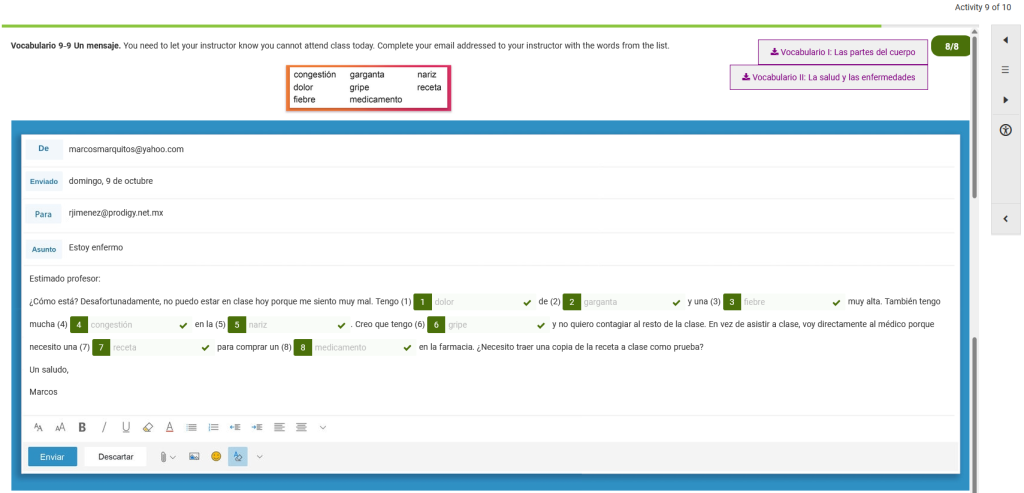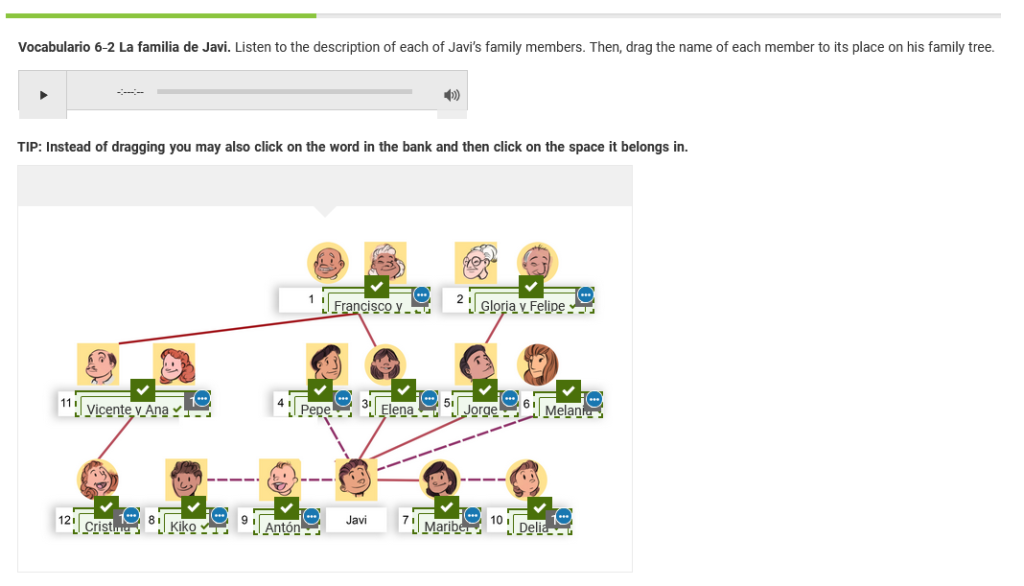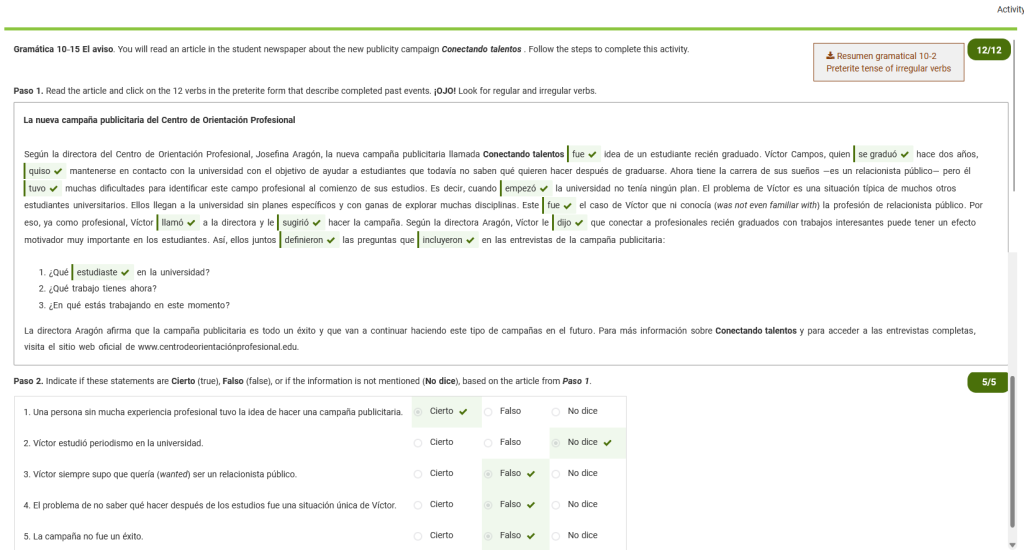Interpretive, Interpersonal, and Presentational Modes of Communication
Exploring Culture
This semester we explored Spanish cultures both on LingroLearning and in many of our discussion boards. We explored the topics of families, food, health, and work in Spanish culture and the differences between the and what we are used to.
Reflection
The artifact that I included was the Discussion board where we discussed, as a class, the differences in family structure and relationships between the U.S. and Hispanic culture. Prior to this class I have had the benefit of traveling to many other countries including a couple different areas in Spain, while I was in the military. I think that learning different cultures is very important to building character and helps people realize that in a lot of cases there isn’t a right or wrong way. Our cultures have a significant impact into our personalities. I also think learning the culture adds a lot to learning the language.
Artifact: https://oureverydaylife.com/importance-of-family-structure-in-hispanic-families-9890197.html

Engaging in Communities
Engaging in the local and global communities can help you build a greater understanding of the people you interact with on a daily basis. By learning Spanish you increase the number of people in these communities that you are able to connect with.
Reflection
While I haven’t really engaged in my local community through this class, I did get the opportunity to connect with some people in other countries through the TalkAbroad program. My artifact for this topic was the first TalkAbroad conversation that I had. I had the opportunity to converse with a very nice woman who lives in Nicaragua. Our conversation was not flawless, but we were able to communicate with each other and discuss our families and some other topics.
Artifacts:
Audio: https://drive.google.com/file/d/1fdBRma9g7ZQWFr-oNx-uS4oeSpfIPK5v/view?usp=sharing
TalkAbroad Worksheet: https://drive.google.com/file/d/1BJOnP5-hLuCFywKZ2qQY-XVvMjYFjS7g/view?usp=sharing
Interpersonal Communication
We had two TalkAbroad conversations this semester, where we were able to do a live video chat with Spanish speakers in other countries. We also had multiple live video conversations with Profe. Mitchell this semester. In addition to having video conversations, we had several discussion boards where the students in the class communicated with each other and discussed many topics related to Spanish.
Reflection
The first TalkAbroad conversation went well, but when reviewing the conversation I learned some lessons that I tried to implement into my planning for our second conversation. I felt that the second conversation with another University student from Argentina went smoother. There were still some moments where I didn’t understand what she was saying at first, but we were able to work through it. I feel that having done two conversations I could now prepare even better for a third.
Artifacts:
Audio: https://drive.google.com/file/d/1fdBRma9g7ZQWFr-oNx-uS4oeSpfIPK5v/view?usp=sharing
TalkAbroad Worksheet: https://drive.google.com/file/d/1BJOnP5-hLuCFywKZ2qQY-XVvMjYFjS7g/view?usp=sharing
Presentational Speaking
We didn’t do a lot of presentational speaking this semester and focused more on interpersonal speaking. The artifact that I have chosen for this topic is an audio assignment from earlier in the semester where we were reading a list of Spanish words.
Reflection
In the video that I have posted we read through a list of Spanish words and were graded on pronunciation. I did fairly well on the assignment. The only comment I got was related to my pronunciation of the letter “r”, and I think that I am better able to pronounce it now.
Artifact:
https://drive.google.com/file/d/113n4l7OvGU4sy2iwfFgIcm8WZNFke1Dr/view?usp=share_link
Presentational Writing
This semester there were a few examples of presentational writing. On the exams there were some examples of having to write full sentences in Spanish based on something we have read. We also generally had to write a full sentence in Spanish in each of our discussion boards. In LingroLearning there were also many activities that involved writing in Spanish.
Reflection
I feel that my ability to write complete sentences in Spanish has grown considerably over the semester. I still find myself looking up words and verifying my sentences when I am done writing them, but more and more I am able to write full sentences and they end up correct. This semester we learned many different grammatical rules that were new to me, like past tense, informal and formal commands, etc. While I have not mastered all of these rules yet, I feel like I can get them right most of the time, but I still need to work on memorizing some of the words that deviate from the rules.
Artifact:

Interpretive Listening
Many of the assignments that we did this semester on LingroLearning involved listening to audio clips and answering questions based on the audio. There were also quizzes that we had where we had to listen to audio and identify what was being said. The assignment I selected was from LingroLearning and involved listening to short audio clips describing an individual’s family and building their family tree.
Reflection
Listening to Spanish speaking is an important skill in learning Spanish. I think the hard part sometimes can be that the speaker may talk faster than your brain can decipher what they are saying, but it is important to train your brain to think in Spanish instead of translating everything. Sometimes it can help if you can pick out the words that you know and infer what the person is talking about. I have struggled sometimes with these problems, but I feel that I have learned some techniques to make it easier. I do still sometimes get stuck on a certain word that is important to understand and have to repeat the audio clip to listen again.
Artifacts:
Audio: https://drive.google.com/file/d/1-awvwzAsYRrlweS0-rI3F5HeVdaX67ep/view?usp=sharing

Interpretive Reading
In class this semester there were very many assignments in which we were required to read Spanish text and answer questions based on it. The assignment that I have selected as an artifact included reading an article and answering questions about the context of the article.
Reflection
Reading Spanish is an important part of learning Spanish, but it also seems to me to be easier than some of the other parts. When you are reading you can take your time and refer to other parts of the text if you get stuck on a word. Just like listening to Spanish you can use the context to try to determine what an unknown word means, but you don’t have the complication of someone continuing to talk while you do so. I think that reading has been a good way to help me build my Spanish vocabulary and helped me in other areas of learning the Spanish language.
